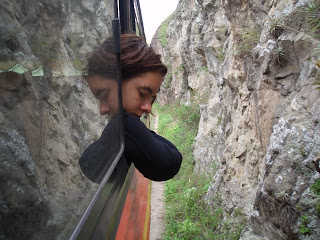 As one landscape, person, idea or moment enters my awareness, another one steps back or even out. Traveling and exploring allow me and often leave me no other choice than to be present. Sometimes this manifests as last minute plans for lodging, as an abrupt change in what I will do next, and as a mindset that tries not to hold onto expectations of outcome, appearance, experience. This approach allows me to quickly adapt to my transforming surroundings, to jump from Ramallah to my cousins home in Aviezar to Jerusalem and now to Turkish North Cyprus.
As one landscape, person, idea or moment enters my awareness, another one steps back or even out. Traveling and exploring allow me and often leave me no other choice than to be present. Sometimes this manifests as last minute plans for lodging, as an abrupt change in what I will do next, and as a mindset that tries not to hold onto expectations of outcome, appearance, experience. This approach allows me to quickly adapt to my transforming surroundings, to jump from Ramallah to my cousins home in Aviezar to Jerusalem and now to Turkish North Cyprus. I have spent the last six days enjoying the adorable company of my good friend Mehmet and his friends and family, enjoying the beautiful beaches, mountains, and food of Cyprus, and searching for more understanding of the conflict I came from and will go back to tonight, and the one here. After over 10 years of civil strife between Turkish and Greek Cypriots (after Great Britain left the Island in a set up for conflict), in 1974 Turkish troops entered Cyprus in order to protect ethnic Turks from violence at the hands of Greek Cypriots. The Island was divided north and
I have spent the last six days enjoying the adorable company of my good friend Mehmet and his friends and family, enjoying the beautiful beaches, mountains, and food of Cyprus, and searching for more understanding of the conflict I came from and will go back to tonight, and the one here. After over 10 years of civil strife between Turkish and Greek Cypriots (after Great Britain left the Island in a set up for conflict), in 1974 Turkish troops entered Cyprus in order to protect ethnic Turks from violence at the hands of Greek Cypriots. The Island was divided north and  south. Turkish Cypriots left their homes in the south to inhabit Greek homes in the north and Greek Cypriots did the same in their travels to the south. Since the Turkish army has occupied the Island, there has been no violence, an uneasy truce that has left the island divided. People seem to have put parts of their lives and the development of their countries on hold since it is not known who will once again loose their homes once an agreement is reached. Entire neighborhoods such as Varosha (pictured is a formerly very popular beach front hotel that is now on the Turkish side and strikingly beautiful in it's spacious emptiness) have been left unoccupied, slowly decaying. Greek Cyprus has entered the European Union, while Turkish Cyprus has not. In 2005 the closed borders were opened allowing people to travel to visit their former villages and homes. Over the last thirty years as well Turkish Immigrants/settlers have moved to the northern part of the island, changing the demographic of the Turkish side dramatically and there are also tensions about this.
south. Turkish Cypriots left their homes in the south to inhabit Greek homes in the north and Greek Cypriots did the same in their travels to the south. Since the Turkish army has occupied the Island, there has been no violence, an uneasy truce that has left the island divided. People seem to have put parts of their lives and the development of their countries on hold since it is not known who will once again loose their homes once an agreement is reached. Entire neighborhoods such as Varosha (pictured is a formerly very popular beach front hotel that is now on the Turkish side and strikingly beautiful in it's spacious emptiness) have been left unoccupied, slowly decaying. Greek Cyprus has entered the European Union, while Turkish Cyprus has not. In 2005 the closed borders were opened allowing people to travel to visit their former villages and homes. Over the last thirty years as well Turkish Immigrants/settlers have moved to the northern part of the island, changing the demographic of the Turkish side dramatically and there are also tensions about this. Clearly there is a lot more to this conflict than I can write about or understand yet. When I first arrived it was hard to resist comparing to the Israeli-Palestinian conflict. Now it is a little easier to understand on its own accord. With the stalemate of the last 30+ years, wounds still run deep for people here in Cyprus. Humanity has created some incredibly knotty, sharp and sticky situations for itself around the globe.
Clearly there is a lot more to this conflict than I can write about or understand yet. When I first arrived it was hard to resist comparing to the Israeli-Palestinian conflict. Now it is a little easier to understand on its own accord. With the stalemate of the last 30+ years, wounds still run deep for people here in Cyprus. Humanity has created some incredibly knotty, sharp and sticky situations for itself around the globe.Meanwhile I am oh so much enjoying and appreciating my life. Feeling gratitude hourly for the opportunities I have had, for what I get to see, for my brain and my health. Tonight I return to Tel Aviv and on Thursday I have the opportunity to facilitate a dialogue for an Israeli organization that works with young American Jewish youth for trips to the wonderland.








